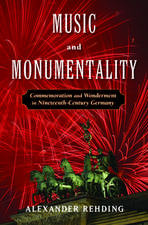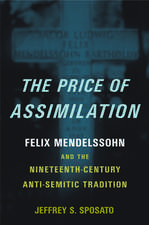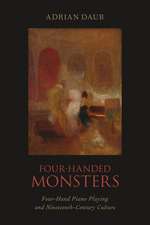Beethoven: A Political Artist in Revolutionary Times
Autor William Kindermanen Limba Engleză Hardback – 5 ian 2021
William Kinderman presents Beethoven as a civically engaged thinker faced with severe challenges. The composer lived through many tumultuous events—the French Revolution, the rise and fall of Napoleon Bonaparte, and the Congress of Vienna among them. Previous studies of Beethoven have emphasized the importance of his personal suffering and inner struggles; Kinderman instead establishes that musical tensions in works such as the Eroica, the Appassionata, and his final piano sonata in C minor reflect Beethoven’s attitudes toward the political turbulence of the era. Written for the 250th anniversary of his birth, Beethoven takes stock of the composer’s legacy, showing how his idealism and zeal for resistance have ensured that masterpieces such as the Ninth Symphony continue to inspire activists around the globe. Kinderman considers how the Fifth Symphony helped galvanize resistance to fascism, how the Sixth has energized the environmental movement, and how Beethoven’s civic engagement continues to inspire in politically perilous times. Uncertain times call for ardent responses, and, as Kinderman convincingly affirms, Beethoven’s music is more relevant today than ever before.
| Toate formatele și edițiile | Preț | Express |
|---|---|---|
| Paperback (1) | 331.12 lei 31-38 zile | |
| Oxford University Press – 23 apr 2009 | 331.12 lei 31-38 zile | |
| Hardback (2) | 256.53 lei 3-5 săpt. | +22.61 lei 6-12 zile |
| University of Chicago Press – 5 ian 2021 | 256.53 lei 3-5 săpt. | +22.61 lei 6-12 zile |
| Oxford University Press – 29 noi 2007 | 821.82 lei 31-38 zile |
Preț: 256.53 lei
Nou
Puncte Express: 385
Preț estimativ în valută:
49.09€ • 52.49$ • 40.93£
49.09€ • 52.49$ • 40.93£
Carte disponibilă
Livrare economică 28 martie-11 aprilie
Livrare express 13-19 martie pentru 32.60 lei
Preluare comenzi: 021 569.72.76
Specificații
ISBN-13: 9780226669052
ISBN-10: 022666905X
Pagini: 256
Ilustrații: 4 color plates, 20 halftones, 26 line drawings
Dimensiuni: 152 x 229 x 28 mm
Greutate: 0.52 kg
Ediția:First Edition
Editura: University of Chicago Press
Colecția University of Chicago Press
ISBN-10: 022666905X
Pagini: 256
Ilustrații: 4 color plates, 20 halftones, 26 line drawings
Dimensiuni: 152 x 229 x 28 mm
Greutate: 0.52 kg
Ediția:First Edition
Editura: University of Chicago Press
Colecția University of Chicago Press
Notă biografică
William Kinderman is professor of music and the Leo M. Klein and Elaine Krown Klein Chair in Performance Studies at the University of California, Los Angeles. His many books include Beethoven, The Creative Process in Music from Mozart to Kurtág, and, most recently, Wagner’s “Parsifal.”
Cuprins
Preface
I. A Tale of Two Cities: Bonn to Vienna
II. The Sublime and Inverted Sublime
III. Beethoven in Heiligenstadt
IV. Path to the Eroica
V. Leonore as “Angel of Freedom”
VI. From Grätz to Wagram and Leipzig
VII. A Double Chill: Beethoven in Metternich’s Vienna
VIII. Then and Now: The Ninth Symphony
Acknowledgments
List of Illustrations and Examples
Note about Abbreviations
Sources and Documents
Index
I. A Tale of Two Cities: Bonn to Vienna
II. The Sublime and Inverted Sublime
III. Beethoven in Heiligenstadt
IV. Path to the Eroica
V. Leonore as “Angel of Freedom”
VI. From Grätz to Wagram and Leipzig
VII. A Double Chill: Beethoven in Metternich’s Vienna
VIII. Then and Now: The Ninth Symphony
Acknowledgments
List of Illustrations and Examples
Note about Abbreviations
Sources and Documents
Index
Recenzii
“Kinderman’s study shows how the great composer maneuvered in times much like our Trumpian own. . . . Hardly a page goes by in [this] superbly written book without offering an unexpected reason to care about Beethoven.”
“William Kinderman, in Beethoven: A Political Artist in Revolutionary Times, reinforces the picture of a fundamentally liberal-minded artist, and gives a telling portrait of the composer.”
"Kinderman focuses on Beethoven’s lifelong belief in freedom and progress as universal ideals that found expression in his music in all periods of his life in ways that continue to resonate to the present day. . . . The book makes a valuable contribution to our understanding of Beethoven as a politically engaged artist and reveals politics to be a vital context for some of his most important works."
“Drawing on letters, sketchbooks, manuscripts, and abundant scholarship, concert pianist and music scholar Kinderman argues convincingly that Beethoven (1770-1827) was 'far from indifferent' to political events that roiled Europe during his lifetime. Offering minutely close exegeses of Beethoven’s works. . . . Kinderman shows how the composer responded to the 'tensions and contradictions' of the time.”
"Pianist and composer Kinderman adds to his shelf of well-regarded contributions to the Beethoven literature with this appealing title focusing on how the political and philosophical movements of the late 1700s to early 1800s influenced the composer’s creative development. . . . Kinderman’s exhaustive scholarship and fluid style combine with up-to-date references to issues such as systemic repression and other provocative topics, which should resonate with both academics and informed general readers."
“William Kinderman, known for his prolific writing on many aspects of Beethoven’s oeuvre, explores in his most recent book, published in the bicentenary year, how a richer grasp of historical and political contexts may enhance our understanding of the meanings, and continued significance of Beethoven’s music. . . . Impressive cross-referencing of political, historical, aesthetic, literary, genetic and analytical studies gives this book a unique quality, that illuminates and connects past and present. . . . This compact, richly impressive volume aspires to a universality worthy of Beethoven himself.”
“At a time when citizen involvement in politics is crucial, Beethoven: A Political Artist in Revolutionary Times presents a broader, more socially relevant vision of political activity. Both professionals and laypersons can appreciate Kinderman’s convincing demonstration that Beethoven’s politics involved not just heroes, fanfares and funeral marches, but also his ideals, performance practice, social relations, and even wit and humour.”
"Written for his 250th anniversary, this biography presents the great composer as a civically engaged thinker, living through tumultuous times, and shows how his music continues to inspire activists around the world to this day."
"After reading Kinderman, considering Beethoven's music in the same old ways will be impossible. . . . Essential."
“Kinderman has written a fresh and fascinating book packed with intriguing thoughts and unexpected alignments about how Beethoven’s politics translated themselves into Beethoven’s music. This is a book that awakens the reader not only with its content but with the love and enthusiasm of its author.”
“This book is a timely contribution to the current trend toward interpreting art primarily in political terms. Placing his aesthetic commentary in a well-grounded biographical and historical context, Kinderman illuminates the political aspects of Beethoven’s life and outlook. He goes on to discuss the ways in which a number of Beethoven’s important works reflect the composer’s lifelong belief in freedom and progress as both personal and universal values.”
“With a keen ear attuned to both musical and historical salience, Kinderman reveals the animating presence of the political in almost every aspect of Beethoven’s life, his work, and his legacy. In doing so, he illuminates the crucial context from which to assess Beethoven’s astonishing achievement of a moral ideal that has resounded from the Age of Revolution to our own times.”
“Kinderman, one of the leading authorities on Beethoven, has succeeded here in connecting an impressive panorama of Beethoven’s life and works with the rarely touched aspect of the composer’s political leanings, an approach that yields particularly memorable insights in connection with his only opera, Leonore/Fidelio.”
“To explore Beethoven’s world as Kinderman does in this revelatory book is to confront multiple tensions and contradictions. Kinderman shows how the political relevance of Beethoven’s music remains tangible: how, for example, in an age of global warming, humanly altered weather patterns, and political indifference to environmental degradation, Beethoven’s Pastoral Symphony is ‘more pertinent than ever before.’ Kinderman combines a scholarly probing of the source material with an astute analysis of selected works by Beethoven, always rooted in their historical and political context. But what makes this beautifully written monograph so telling is the way Kinderman relates Beethoven’s passionate but erratic response to the political turmoil of his age to our own times.”
"William Kinderman’s compact but engrossing book presents a wide-ranging summary of the performance history of the symphony as a political, often politicized work, embracing the use of the recurring theme of the choral finale as the anthem of the European Union, a flash-mob performance in Catalonia, and, most famously, the fall of the Berlin War, when Leonard Bernstein changed Schiller’s and Beethoven’s “Freude” to 'Freiheit.'"
Descriere
Descriere de la o altă ediție sau format:
Combining musical insight with the most recent research, William Kinderman's Beethoven is both a richly drawn portrait of the man and a guide to his music. Kinderman traces the composer's intellectual and musical development from the early works written in Bonn to the Ninth Symphony and the late quartets, looking at compositions from different and original perspectives that show Beethoven's art as a union of sensuous and rational, of expression and structure. In analyses of individual pieces, Kinderman shows that the deepening of Beethoven's musical thought was a continuous process over decades of his life. In this new updated edition, Kinderman gives more attention to the composer's early chamber music, his songs, his opera Fidelio, and to a number of often-neglected works of the composer's later years and fascinating projects left incomplete. A revised view emerges from this of Beethoven's aesthetics and the musical meaning of his works. Rather than the conventional image of a heroic and tormented figure, Kinderman provides a more complex, more fully rounded account of the composer. Although Beethoven's deafness and his other personal crises are addressed, together with this ever-increasing commitment to his art, so too are the lighter aspects of his personality: his humor, his love of puns, his great delight in juxtaposing the exalted and the commonplace.
Combining musical insight with the most recent research, William Kinderman's Beethoven is both a richly drawn portrait of the man and a guide to his music. Kinderman traces the composer's intellectual and musical development from the early works written in Bonn to the Ninth Symphony and the late quartets, looking at compositions from different and original perspectives that show Beethoven's art as a union of sensuous and rational, of expression and structure. In analyses of individual pieces, Kinderman shows that the deepening of Beethoven's musical thought was a continuous process over decades of his life. In this new updated edition, Kinderman gives more attention to the composer's early chamber music, his songs, his opera Fidelio, and to a number of often-neglected works of the composer's later years and fascinating projects left incomplete. A revised view emerges from this of Beethoven's aesthetics and the musical meaning of his works. Rather than the conventional image of a heroic and tormented figure, Kinderman provides a more complex, more fully rounded account of the composer. Although Beethoven's deafness and his other personal crises are addressed, together with this ever-increasing commitment to his art, so too are the lighter aspects of his personality: his humor, his love of puns, his great delight in juxtaposing the exalted and the commonplace.






















